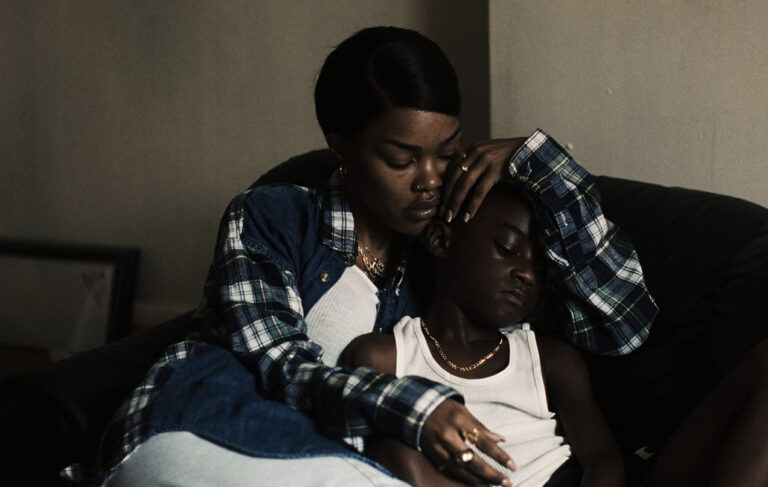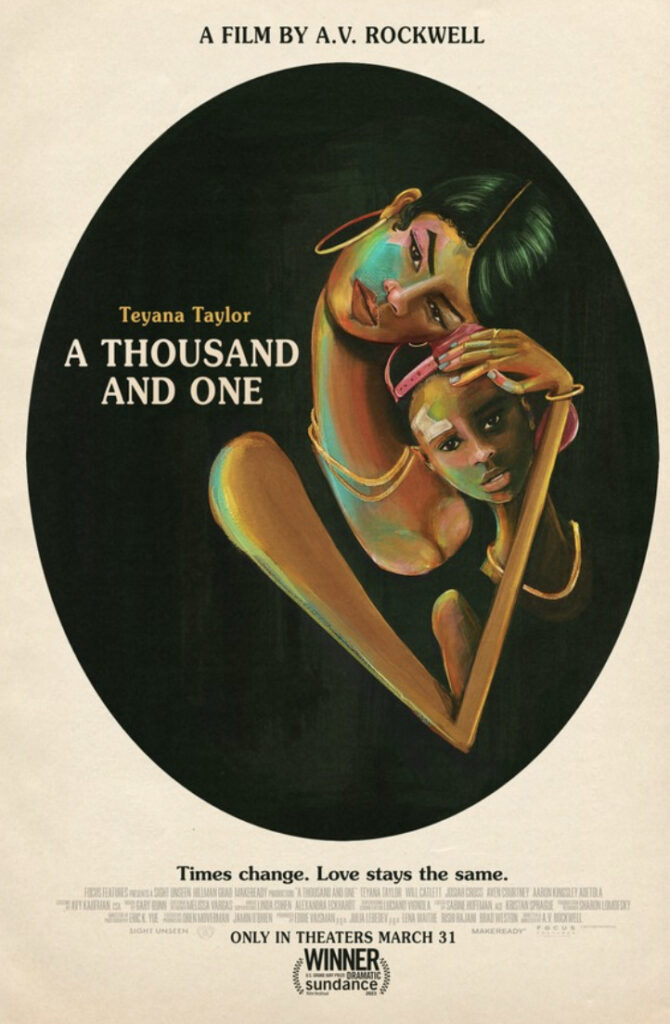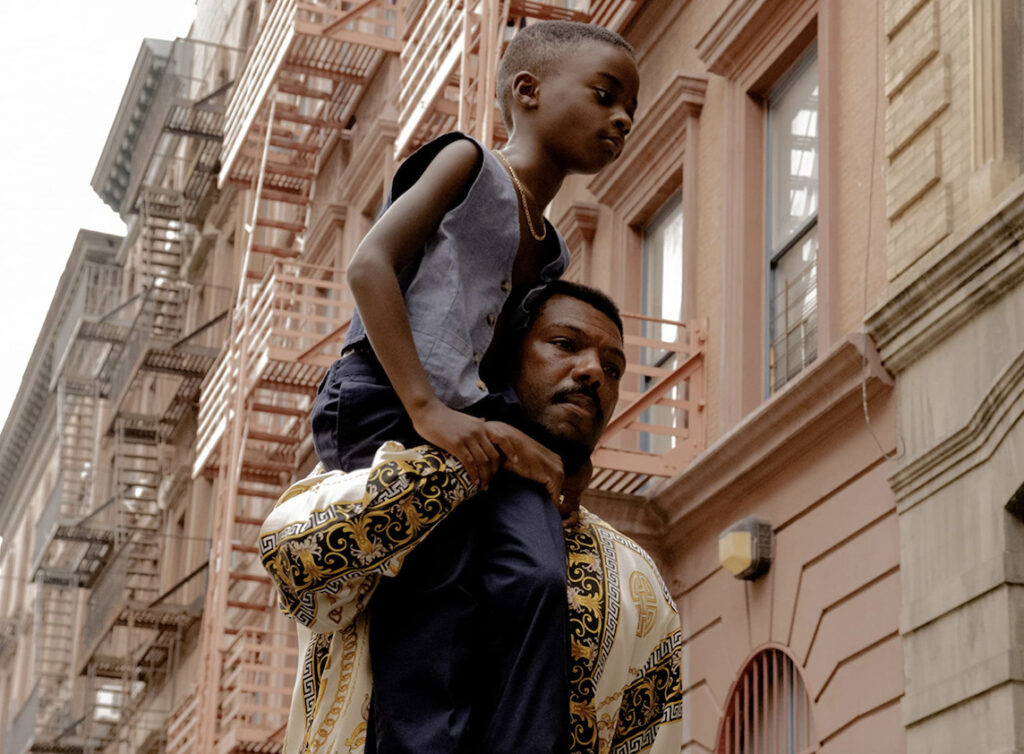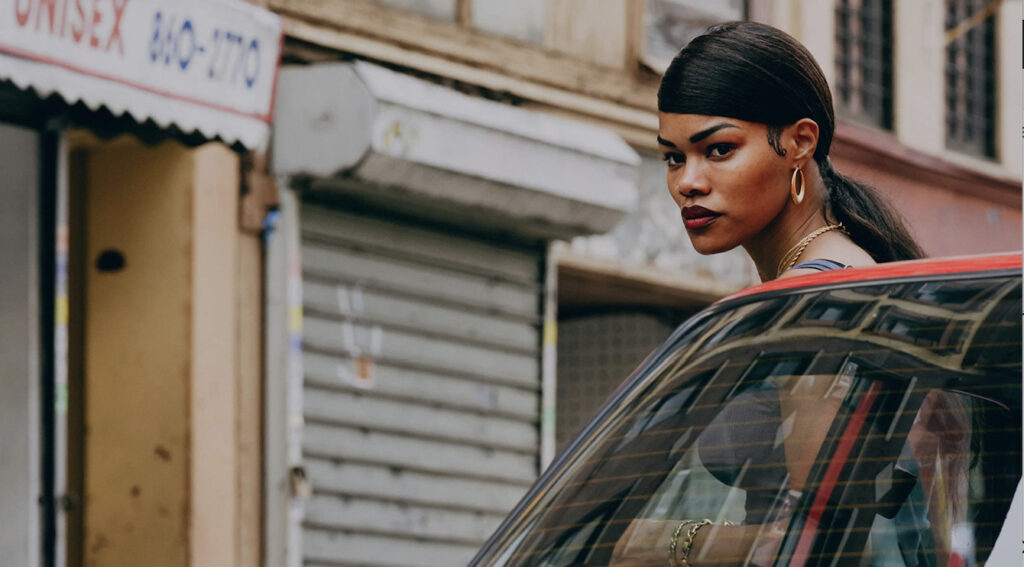
Synopsis : A THOUSAND AND ONE follows unapologetic and free-spirited Inez (Teyana Taylor), who kidnaps six-year-old Terry from the foster care system. Holding onto their secret and each other, mother and son set out to reclaim their sense of home, identity, and stability, in a rapidly changing New York City.
- Rating: R (Language)
- Genre: Drama
- Original Language: English
- Director: A.V Rockwell
- Producer:Eddie Vaisman, Julia Lebedev, Lena Waithe, Rishi Rajani, Brad Weston.
- Writer: A.V. Rockwell
- Release Date (Theaters): Wide
- Runtime:
- Distributor: Focus Features

Exclusive Interview with Actors William Catlett and Josiah Cross
Q: Director A.V Rockwell wrote a wonderful script about a resilient woman that she knew through her life. What was your first impression of the script that you read stood out for you?
WC: I thought it was great. I felt like this has been a long time coming. Someone has really poured their spirit out in these pages. Her writing is real. We really didn’t have to act, we just got to pick up what was there. Our task was beautiful from top to bottom. There was not one weak link in the cast, and the casting director did a great job of casting the project. And then at the same time, I get to meet a wonderful artist in Josiah Cross. I’m so thankful to be a part of it, because I know this is a launching pad for a lot of us.
JC: I feel like for us actors, we try to find ourselves in the work that we’re doing. In the beginning as I was reading the script, like Will said, it didn’t take a lot of work for me to see myself in this script, in this role. It was immediate, and with that immediate reaction, there was an urgency that swelled inside of me. Again, I feel like in this craft, having wonderful dance partners is the magic. Will Catlett [was] that dance partner for me where there were questions that I needn’t have to ask, they were answered. There were things he was telling me but he wasn’t saying the words. I am so grateful that A.V. saw something in me that she thought I could bring to light.
Q: Will, there were a lot of households in Harlem in the Nineties where some of the kids grew up in a single-parent home or parents got into a drug business that kids were afraid of and some of the kids were staying out of trouble by living in a street or crashing on the friends apartment like the movie “Kids”directed by Larry Clark. How much does it resonate with you about the Nineties in this film?
WC: Yeah, it definitely resonated with me because my oldest sister — she’s not alive anymore, she’s presently with the Lord — she was on drugs all her life. I watched it. I watched what the crack epidemic did to my family, so I can identify with that. I’ve seen a lot of friends grow up in single-parent households. I’ll never forget a buddy of mine named Bobby. We went to school together, he was smart, smart as a whip, and he was saying “You’re so lucky man, you have your daddy for life.” Because his dad was there but wasn’t there, you know, because of the divorce between his dad and his mom.
I would hear those things growing up and I realized that [I didn’t have to] play at lucky, that I was lucky because I had someone to show me how to be a man. My mom said it all the time. She’d say, “Listen, a woman’s voice doesn’t carry a man’s guts.” She’s not saying that a woman doesn’t have power to steer a kid in the right direction. But there’s something about a man — when a man checks his manhood, we can hear it — [like] if I tell Josiah, “Bro, you don’t need to be going down that road, you don’t need to do that.” Now if his mom said, “You don’t need to be going down to that corner. You don’t need to do it” — it’s not going to hit his DNA in a way that it needs to, because the man’s voice is sticking it to another man.
So in this film, like the mom that lets Inez come move in, and they’re having a scene without words, and she’s like, “Yeah, my daughter’s still in the street” — I think a lot of healing will come from this film. There’s people who will watch it, and their kids are still in the streets. So they can find some type of healing and have some type of understanding. Because love doesn’t change, even though your kid is still in the streets.
Q: Josiah, your character, Terry, is played by three actors: Aaron Kingsley Adetola, Aven Courtney, and you. What kind of conversation did you have with director A.V. Rockwell prior to shooting this film? How did she want you to portray your character?
JC: We spoke a little bit. The unique A.V. did was that she isolated the Terrys individually, but everyone else in the film got to experience all three versions of Terry. So Teyana [Taylor, who plays Inez, Terry’s mom] got to independently experience six-year-old Terry, thirteen-year-old Terry and then me. But each of us individually, we only got to experience being alone.
I think A.V. did that on purpose, in a way so that we could tell a very specific story that would then extend universally. It was a brilliant narrative device to me, because you have no biases in your performance. You have no crutches. “A thirteen-year-old did this, I need to make sure that I’m moving my neck like this” [gestures].” It was a natural commitment to the truth in the role that A.V. wrote that I think all three of us adhered to, because of the discipline and commitment that we had to the beauty of the story itself.

Q: Teyana Taylor’s performance throughout the film was a tour de force. Can you guys talk about an essential scene with her? Will, you had your character, Lucky, confront Teyana’s character, Inez, and push her to get out of the apartment. Can you talk about shooting that sequence with her?
WC: First and foremost, Teyana’s an artist. Though sometimes we lock people in these boxes, as just a rapper that’s now acting or a singer that’s acting. She’s an artist, so she’s going to be able to lock in what she needs to, and I think this role was destined for her, it’s perfect for her. Only she can play it — she’s from Harlem.
But in that scene, it’s a sparring match. I’m seeing what she’s doing, and she’s seeing what I’m doing, and when she pushes me against that stove, she’s really pushing me against that stove. I’m glad that they kept the thing that fell off, because that wasn’t planned to fall off the wall. And she’s a joy to work with. She’s so giving.The same way with Josiah. They’re just giving.
I want to touch on something that you asked Josiah when he talked about A.V. separating Terry at six, Terry at thirteen, and Terry at 17. What’s funny to me, and ironic, is that the moves that they make, any hand gestures, are all the same, even though they never met. I was like, wow! That’s when you know that there’s something else taking over, and you’re a part of something that is so special.
JC: Yeah, I didn’t even think about that until Will just said it. Because Will, I was watching the trailer back the other day, and there was this hidden move that baby Terry did, and they put it in the trailer that he looked over his shoulder. And they kind of mixed me turning over my shoulder, and it was like, the same, exact way he looked over his shoulder.
Q: Josiah, can you talk about the sequence about the birth certificate, your character Terry confronting Inez at the end?
JC: Finding the birth certificate, confronting Inez, A.V. stressed the importance of it being a climactic moment of the engagement of this long journey that we’ve been on and the importance of that. The stakes are high: this is it. This isn’t just, “Oh, you found out that your mom used to work at the grocery store down the street.” No, you just found out your mother is not your mother. But I’m taking all of this information in.
It’s like, a black-white American is also raised by a single mother, and the components that come with that. And then you add on top of it that, wait a minute: now it’s being called into question whether she’s my mother or not. I think that just naturally and holistically puts me in a place of [anxiety] as a person. Even me, feeling comfortable with articulating that in front of people on the set. I’m comfortable in mine, with baring my soul [for the truth]
It goes back to what Will said about being given to us as artists — to me, we’re in the service industry. We’re going to serve something that is beyond us. So I had no choice but to serve that moment in me being anxious, and me being scared, just as Terry was in those moments.

Q: Director A.V. Rockwell was really conscious about that reflection of Harlem in the Nineties and then the 2000s, with gentrification, stop-and-frisk policing and things like that. How did your acting choices reflect the Nineties in this film?
WC: Well, I think you need it. That’s Harlem. That’s America. You need those moments in the film so they can ground the actor, it can ground you into reality. You can see it when you walk in Harlem. You see the glass buildings, you see the mom-and-pops, you see the bodegas going out of business. You see the life — even watching Teyana, everywhere she would be shooting, the whole city would come out. So [as] you’re shooting this, about thousands of people are just coming out to see her. And at the same time, you’re seeing a new building go up, and that’s not Harlem — but now it is Harlem, where you’re seeing people walk dogs — and only one walked dogs through that area [before].
So I’m really so fortunate we are — that A.V. had it in mind to bring all of that together within the span of this film. Then people can see that and relate to that.
Q: This film won the top prize at the Sundance Film Festival. What was your reaction when you heard that?
JC: Will and I knew. We knew it.
WC: I’m laughing, because Josiah and I had this conversation waaaay before that announcement came out at Sundance. We just knew we were part of something special, and you know when you have that special project. We knew that it was going to do great things, but to win the Grand Prize at Sundance is a huge achievement. I’m looking forward to it being recognized not just at Sundance, but at the Academy, and the SAG Awards, and the Golden Globes. The more people who see it, the more people can identify themselves, and find some type of refuge and healing and understanding. So the more people see it, the more people are aware of themselves.
Q: Thank you so much.
Check out more of Nobuhiro’s articles.
Here’s the trailer of the film.

